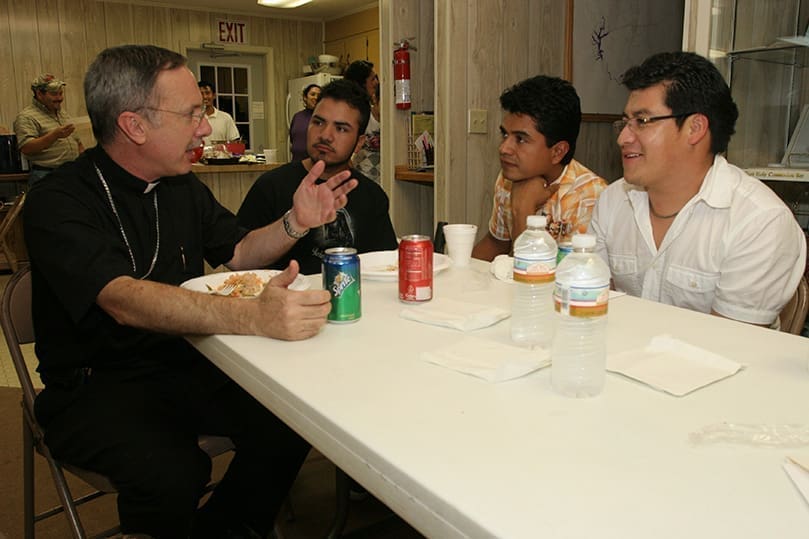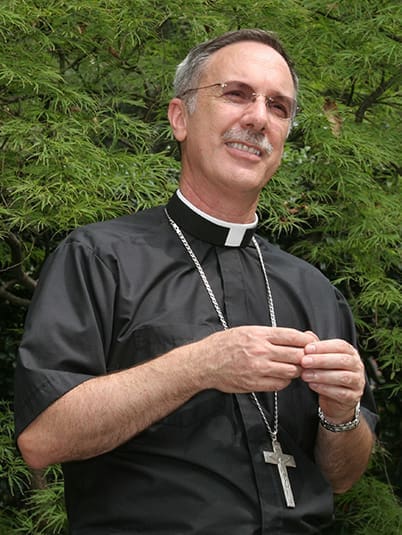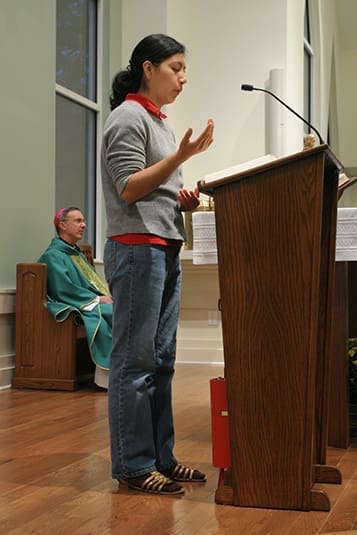 Photo By Michael Alexander
Photo By Michael AlexanderAtlanta
A Pastor At Heart, He Accepts New Ways To Serve
By ANDREW NELSON, Staff Writer | Published October 1, 2009
It was a Friday evening in September when then Msgr. Luis Zarama drove more than 100 miles to keep his commitment to the young people of Clayton.
In this community near South Carolina, the line of women and men waiting for him for confession was so long, Msgr. Zarama cut it off to get ready for Mass. He resumed hearing confessions afterward. Eating the potluck dinner, he chatted and joked with the roomful of Latinos.
Sergio Ruiz-Acevedo, 31, a native of Mexico, makes a point to attend these gatherings. “It is great. He is a very dedicated priest. After he left (his position as pastor), he still worries about us,” said Ruiz-Acevedo, who has known Msgr. Zarama for six years. “He is like a father with children, that’s how we feel.”
On Tuesday, Sept. 29, Msgr. Zarama became the first auxiliary bishop in Atlanta since the 1960s with his ordination at the Cathedral of Christ the King. He will assist Archbishop Wilton D. Gregory in serving the Catholic community in North Georgia.
“My goal is to serve and help the archbishop. The archbishop is the head of the archdiocese. I will help him,” said Bishop Zarama. He will continue as vicar general, overseeing several offices in the archdiocese and as the judicial vicar.
Since moving to Atlanta in the early 1990s from Colombia, the new auxiliary bishop has served in an downtown parish, become the first Hispanic pastor here and been a key administrator to Archbishop Gregory as the Hispanic population has ballooned to nearly half the 750,000 Catholics here, not including the undocumented population of Hispanics.
Bishop Zarama is the first Colombian native to become an auxiliary bishop in the United States among nearly 30 Hispanic bishops.

Bishop-designate Luis Zarama
Photo By Michael Alexander
Archbishop Gregory said his auxiliary bishop will share in all of the ways that a bishop leads and guides the church.
Bishop Zarama’s “Hispanic heritage will be a special sign of joy for our Hispanic community, but we will share all of the pastoral services of this local church,” Archbishop Gregory said.
He said Bishop Zarama’s appointment is “another example of the diversity of this community of faith.”
Journalist Rocco Palmo, who writes the “Whispers in the Loggia” blog about Catholic Church events, called Bishop Zarama’s elevation a “milestone moment.”
“The face of the American Catholic Church, on a whole, is changing,” he said. Nearly one in three Catholics in the United States is Latino and they are expected to be a majority in the Atlanta Archdiocese in a couple of years.
The promotion of a Hispanic priest to the position of auxiliary bishop, people say, reflects the growing importance of Latinos here.
“I personally always thought we needed an auxiliary bishop, preferably someone who is Hispanic,” said Father Jaime Barone, pastor of St. Matthew Church, Winder.
The people felt “under siege” in recent years as laws targeting immigrants were enforced, he said. An Hispanic auxiliary bishop can inspire people with hope, he said.
“I always felt that Luis Zarama was the right person for the job,” he said.
And in a first for any U.S. diocese, the Catholic spiritual leaders will be an African-American and an Hispanic.
“It is an expression of our church, our catholicity. The universality of the church is here in Atlanta,” said Bishop Zarama. “We don’t only have African-Americans, Hispanics, we have Anglos, Irish people, Korean, Vietnamese, people from Africa. That gives us a sense of what we are, that is a beautiful thing. We can learn from each other and enrich each other.”
Family Lived The Faith
Bishop Zarama’s hair is short, a salt and pepper mix and he wears oval shaped glasses. He is trim, running about 12 miles a week. He lives in the Buckhead neighborhood of Atlanta. Around his neck is the large silver cross, a gift from Archbishop Gregory. It was given to the archbishop by Pope John Paul II.
Bishop Zarama laughs easily and often, like at the idea of him praying in the morning. “Evening is my time for prayer. Morning, my brain doesn’t work in the mornings.”
The oldest of six children, the 50-year-old grew up living a middle class life, with a father, Rafael, who managed farms and city properties. His mother, Maria Teresa, whose parents came from Switzerland, raised the children. His hometown of Pasto, Colombia, sits high in the mountains of southwest Colombia. It was a tight-knit family, with weekly Saturday dinners at his grandparents’ home.
“(My grandfather) took us to Mass. To see his devotion to the Eucharist was beautiful. And usually after Mass he took us to ice cream,” he said.
Asked about saints he feels close to, he mentions St. Joseph, the foster father of Jesus, and St. Therese of the Child Jesus, also known as St. Thérèse of Lisieux, the Carmelite saint, known as the “Little Flower,” who strove to live simply with great love.
“For me it is an example of becoming a saint not by being like someone else. But God works through what the people really are. That is something that I learned. I don’t need to be like (a saint), I need to be myself,” he said.
From The Classroom To The Priesthood
Bishop Zarama attended Catholic schools, including a minor seminary high school. He dreamed of becoming an airplane pilot before poor eyesight dashed the idea. Then after high school he wanted to follow in his father’s business. “That was my expectation. When I finished high school, I really didn’t think at that time to study. I asked my dad to give me one of the farms to work there. I really enjoyed that.”
He studied philosophy and theology when his father encouraged him to get a degree first and then he could choose a place to work. (He later earned an advanced degree in canon law at the Universidad Javeriana in Bogotá.)
He became a teacher. For 11 years, the future bishop was in a classroom, grading papers, teaching students from kindergarten to 12th grade.
His decision to pursue the priesthood unfolded as he worked in the classroom.
“I cannot say I desired to be a priest from one day to another day. It was a process. I was searching for something inside of myself. I was having a great life. I was so happy to be a teacher, doing some business there, helping my dad with things of the family. I think inside of myself I knew it, but what I needed was to accept that. I was in denial, saying it was not my time.”
The idea of her oldest son becoming a priest took some time for Bishop Zarama’s mother to adjust to. “I was the oldest and she was expecting me to be married. But she never opposed. Now, she is very happy because (she says) ‘I never thought from your side I would have all these grandchildren.’ All my parishioners, for my mom, are grandchildren.”
Atlanta Priest, Years In The Mountains
In 1991, he came to Atlanta at the suggestion of archdiocesan priests. In June 1993, he was ordained a deacon and served at downtown Atlanta’s Sacred Heart Parish. Five months later, he was ordained a priest.
He was the first Hispanic priest named as a pastor when he took over St. Mark Church in Clarkesville, in the mountains of North Georgia. He stayed there for 10 years as the parish community and its mission of St. Helena, in Clayton, grew to include scores of Hispanic families.

Lucy Hernandez proclaims the word of God during a Sept. 18 Mass at St. Helena Church, Clayton. Bishop Zarama, background, made his monthly visit to the parish where he once served as its pastor. Photo By Michael Alexander
Lucy Hernandez, 22, and her family were part of the early wave of Hispanic families in Clayton. Hernandez served as a reader at Bishop Zarama’s ordination.
When she thought about a vocation to religious life as a sister, Hernandez turned to Bishop Zarama. Slow down, he told her. Pray about it, he said.
“He has helped not only me, but more people,” she said.
Now, he will celebrate her nuptial Mass when she marries in October.
“He has a big spirit, a lot of people like him. He is a blessing from God,” Hernandez said.
During his time in Clarksville, the parish outgrew its 200-seat church. He led the community to build a new $900,000 church, double the original size. When he left there, the parish was debt free.
Key Administrator In Archdiocese
He stayed at the parish on the outskirts of the archdiocese until Archbishop Gregory asked him in April 2006 to serve as one of his vicars general, a senior administrative leader in the archdiocese. A year later, Pope Benedict XVI named him Chaplain of His Holiness with the title of monsignor. In 2008, he was appointed to serve as the judicial vicar for the archdiocese’s Metropolitan Tribunal. He sits on the personnel review board, the College of Consultors and is a trustee at Southern Catholic College.
Msgr. Joe Corbett, also a vicar general in the archdiocese, said his colleague “has a solid reputation for being a good, holy and kind priest.” The two struck up a friendship when they were on a pilgrimage to Italy several years ago. They also are neighbors.
“Frequently I am able to concelebrate daily Mass with him and truly value his thoughtful, inspirational and joyful homilies,” Msgr. Corbett wrote in an e-mail.
Bishop Zarama said being a pastor was a “beautiful school” to learn about being a priest and he has overcome his initial reluctance about serving as an administrator. “I am serving in another capacity. That helped me enjoy what I am doing.”
‘Speechless’
Bishop Zarama admits to being tongue-tied when Archbishop Gregory called him about being his auxiliary bishop.
It was Tuesday, July 7, around 2 p.m. and he was in his third floor office when he received a phone call from the archbishop, who was on vacation, telling him the pope named an auxiliary bishop for Atlanta.
“I couldn’t believe what I heard. And I asked him, ‘What?’”
“He said, yes, the pope named you my auxiliary bishop in Atlanta. What do you say?”
“I was silent. I couldn’t say anything. I couldn’t believe first of all. I was speechless.”
“He said to me, ‘Luis, say something.’ I don’t know what I said.”
“And he asked me again, ‘What do you think? What is your answer?’”
“Archbishop, if I can serve you and help you, it’s OK.”
“It was a surprise and I was in shock. A big surprise.”